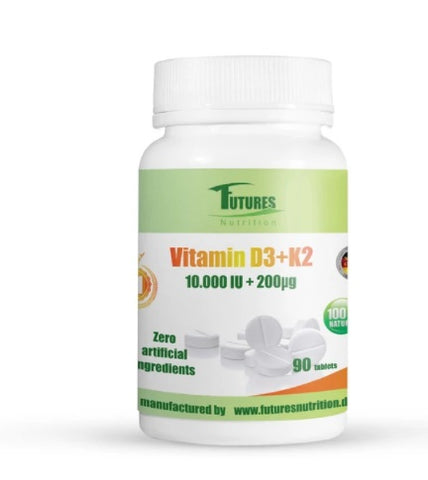
What is Vitamin D3?
Share
Vitamin D3 is
Cholecalciferol is a vitamin D3 that supports calcium uptake in the body. Cholecalciferol is often used to supplement people who do not take enough vitamin D with their regular diet to maintain optimal health.
Vitamin D3 adverse reaction

Hyperkalaemia
An overdose of Vitamin D3 may lead to dangerously high calcium levels. The absorption of calcium from the bones is facilitated by high levels of vitamin D metabolites in the blood. Excessive calcium levels in the blood can lead to numerous symptoms and consequences. The most serious are the following:
- lack of appetite
- Constipation and diarrhoea
- mental or physical confusion
- a feeling of nausea
- stiffness of muscles and joints
- Headaches that don't go away
- restlessness and irritation
- a feeling of fatigue that cannot be articulated
- Uncommon heartbeat and decreased reflexes are symptoms of muscle weakness.
- with a metallic aftertaste
Renal

Crystals can form in the soft parts of the body when the circulation is overloaded with calcium and phosphate. If these crystals are present in high concentrations, they may cause tissue or organ damage. The kidney is particularly susceptible to calcium deposition due to its filter function and the numerous microscopic passages it contains. Nephrocalcination may occur when calcium deposits settle in the kidney tissue. It can lead to kidney failure if the disease is severe enough.
- Nephrocalcinosis is expressed by:
- a feeling of nausea
- Chills and fever
- severe abdominal, back or gluteal discomfort, including in men the testicles
The average number of IE taken by the persons concerned was 3.600.000 in less than three months. The side effects included sudden kidney failure.
irregular heartbeat and heart attack
In people with pronounced hypercalcaemia, there is an increased risk of heart rhythm disorders as the function of the heart cells is limited. People with abnormally high calcium or phosphate levels in the blood may develop calcium or phosphate deposits or plaques in the arteries or heart valves.
- Vitamin D poisoning can cause the following symptoms in the heart:
- Chest pain caused by irregular heart rhythm may occur in the short or long term.
- a feeling of fatigue that cannot be articulated
- High blood pressure, dizziness and pain during physical exertion
- Uncomfortability in the chest
Broken bones and bone pain
Vitamin D deficiency can lead to hypercalcaemia, which results in bone disorders. Some signs and symptoms are:
- Bone pain or discomfort, an increased tendency to fall and break and a bent posture are signs of instability.
- Severe back or joint discomfort
- Violation of height or length of limbs.
Dehydration
Increased calcium levels in the blood may impair renal function. Moderate dehydration can cause symptoms such as:
- a restless feeling in the mouth and on the tongue
- irritability
- cloudy eyes
- increased saturation
- Reduced urine excretion
- the likelihood of tears being shed decreases
- Skin that takes a long time to recover after being clipped
- Severe dehydration can lead to life-threatening situations. Other symptoms of this disease are:
- a weak or non-existent pulse
- a blood pressure below the normal value
- Fatigue the cause of which is not known
- slight or no urinary excretion
- Unconsciousness
Gastrointestinal
Acute pancreatic inflammation can be caused by hypercalcaemia, a critical kidney damage caused by vitamin D intoxication.
The symptoms of pancreatitis are upper gastrointestinal complaints that radiate into the back, nausea, vomiting and weight loss.
Lung damage
Calcium and phosphate in the blood combine and store in the soft tissue to form crystals in the blood. As filters, soft tissue organs such as the lungs are particularly susceptible to crystalline depositions. Calcium salt deposits in the lung are called ectopic calcifications and can damage the organ.
The following are some symptoms of the resulting lung damage:
Cough and difficulty breathing
Uncommon in the chest
How much vitamin D3 per day

600 IE or 15 mcg per day is the recommended daily maximum quantity for persons of one to 70 years of age; for people from 70 years it is 800 IE or 20 mcg. The safe upper limit for the inclusion of: Vitamin D is present at 10.000 IE or 100 mcg for people over nine years. It is doubtful that a person can take too much vitamin D without causing dangerous effects.
Vitamin D3 adverse reactions in anxiety

Vitamin D is available in two forms: ergocalciferol (often D-2) and cholecalciferol (commonly referred to as D-3). Hyperkalaemia, a disorder characterized by abnormally high blood calcium levels, may occur by excessive intake of D vitamins. On and for itself seems Vitamin D-3 not be associated with anxiety. Anxiety could be a sign of underlying hypercalcaemia. You should see an experienced doctor before taking vitamin D preparations.
